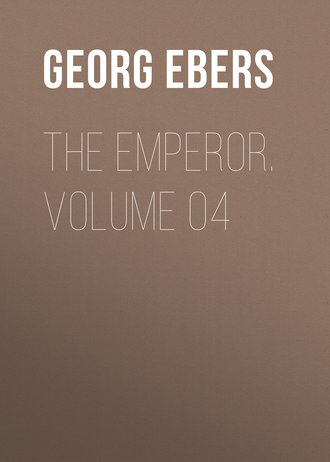
Georg Ebers
The Emperor. Volume 04
"I have been so glad to do it," said the deformed girl, "and there—now I have finished."
"And I too," said the widow, pressing the last leaf on to its fellow with a cloth, and then adding her pile of finished sheets to Mary's.
"Thank you very much," murmured Selene, with downcast eyes, and rising from her seat, but she tried to support herself on her lame foot and this caused her such pain, that with a low cry, she sank back on the stool. The widow hastened to her side, knelt clown by her, took the injured foot with tender care in her delicate and slender hands, examined it attentively, felt it gently, and then exclaimed with horror:
"Good Lord! and did you walk through the streets with a foot in this state?" and looking up at Selene she said affectionately. "Poor child, poor child! it must have hurt you! Why the swelling has risen above your sandal-straps. It is frightful! and yet—do you live far from this?"
"I can get home in half an hour."
"Impossible! First let me see on my tablets how much the paymaster owes you that I may go and fetch it, and then we will soon see what can be done with you. Meanwhile you sit still daughter dear, and you Mary rest her foot on a stool and undo the straps very gently from her ankle. Do not be afraid my child, she has soft, careful hands." As she spoke she rose and kissed Selene on her forehead and eyes, and Selene clung to her and could only say with swimming eyes, and a voice trembling with feeling:
"Dame Hannah, dear widow Hannah."
As the warm sunshine of an October clay reminds the traveller of the summer that is over, so the widow's words and ways brought back to Selene the long lost love and care of her good mother; and something soothing mingled in the bitterness of the pain she was suffering. She looked gratefully at the kind woman and obediently sat still; it was such a comfort once more to obey an order, and to obey willingly—to feel herself a child again and to be grateful for loving care.
Hannah went away, and Mary knelt down in front of Selene to loosen and remove the straps which were half buried in the swelled muscles. She did it with the greatest caution, but her fingers had hardly touched her, when Selene shrank back with a groan, and before she could undo the sandal, the patient had fainted away. Mary fetched some water and bathed her brow, and the burning wound in her head, and by the time Selene had once more opened her eyes, dame Hannah had returned. When the widow stroked her thick soft hair, Selene looked up with a smile and asked: "Have I been to sleep?"
"You shut your eyes my child," replied the widow. "Here are your wages and your sister's, for twelve days; do not move, I will put it in your little bag. Mary has not succeeded in loosening your sandal, but the physician who is paid to attend on the factory people will be here directly, and will order what is proper for your poor foot. The manager is having a litter fetched for you.—Where do you live?"
"We?" cried Selene, alarmed. "No, no, I must go home."
"But my child you cannot walk farther than the court-yard even if we both help you."
"Then let me get a litter out in the street. My father—no one must know—I cannot."
Hannah signed to Mary to leave them, and when she had shut the door on the deformed girl, she brought a stool, sat down opposite to Selene, laid a hand on the knee that was not hurt, and said:
"Now, dear girl, we are alone. I am no chatterbox, and will certainly not betray your confidence. Tell me quietly who you belong to. Tell me —you believe that I mean well by you?"
"Yes," replied Selene, looking the widow full in the face— a regularly-cut face, set in abundant smooth brown hair, and with the stamp of genuine and heart-felt goodness. "Yes—you remind me of my mother."
"Well, I might be your mother."
"I am nineteen years old already."
"Already," replied Hannah, with a smile. "Why my life has been twice as long as yours. I had a child, too, a boy; and he was taken from me when he was quite little. He would be a year older than you now, my child— is your mother still alive?"
"No," said Selene, with her old dry manner, that had become a habit. "The gods have taken her from us. She would have been, like you, not quite forty now, and she was as pretty and as kind as you are. When she died she left seven children besides me, all little, and one of them blind. I am the eldest, and do what I can for them, that they may not be starved."
"God will help you in the loving task."
"The gods!" exclaimed Selene, bitterly. "They let them grow up, the rest I have to see to—oh! my foot, my foot!"
"Yes, we will think of that before anything else. Your father is alive?"
"Yes."
"And he is not to know that you work here?"
Selene shook her head.
"He is in moderate circumstances, but of good family?"
"Yes."
"Here, I think, is the doctor. Well? May I know your father's name? I must if I am to get you safe home."
"I am the daughter of Keraunus, the steward of the palace, and we have rooms there, at Lochias," Selene answered, with rapid decision, but in a low whisper, so that the physician, who just then opened the room door, might not hear her. "No one, and least of all, my father, must know that I work here."
The widow made a sign to her to be easy, greeted the grey-haired leech who came in with his assistant; and then, while the old man examined the injured limb, and cut the straps with a sharp pair of scissors, she bathed the girl's face and cut head with a wet handkerchief, supported the poor child in her arms, and, when the pain seemed too much for her, kissed her pale cheeks.
Many sighs from the bottom of her heart, and many shrill little cries betrayed how intense was the pain Selene was enduring. When at length, her delicate and graceful foot-distorted just now by the extensive swelling,—was freed from the bands and straps, and the ankle had been felt and pressed in every direction by the leech, he exclaimed, turning to the assistant who stood ready to lend a helping hand:
"Look here, Hippolytus, the girl came along the streets with her ankle in this state. If any one else had told me of such a thing, I should have desired him to keep his lies to himself. The fibula is broken at the joint, and with this injured limb the child has walked farther than I could trust myself at all—without my litter. By Sirius! child, if you are not crippled for life it will be a miracle."
Selene had listened with closed eyes, and exhausted almost to unconsciousness; but at his last words she slightly shrugged her shoulders with a faint smile of scorn on her lips.
"You think nothing of being lame!" said the old man, who let no gesture of his patient escape him. "That, of course, is your affair, but it is mine to see that you do not become a cripple in my hands. The opportunity for working a miracle is not given to one of us every day, and happily for me, you yourself bring a powerful coadjutor to help me. I do not mean a lover or anything of that kind, though you are much too pretty, but your lovely, vigorous, healthy youth. The hole in your head is hotter than it need be—keep it properly cool with fresh water. Where do you live, child?"
"Almost half an hour from here," said Hannah, answering for Selene.
"She cannot be taken so far as that, even in a litter, at present," said the old man.
"I must go home!" cried Selene, resolutely, and trying to sit up.
"Nonsense," exclaimed the physician. "I must forbid your moving at all. Be still, and be patient and obedient, or your foolish joke will come to a bad end; fever has already set in, and it will increase by the evening. It has nothing much to do with the leg, but all the more with the inflamed scalp-wound. Do you think," he added, turning to the widow, "that perhaps a bed could be made here on which she might lie, and remain here till the factory reopens?"
"I would rather die," shrieked Selene, trying to draw away her foot from the leech.
"Be still—be still, my dear child," said the good woman, soothingly. "I know where I can take you. My house is in a garden belonging to Paulina, the widow of Pudeus, near this and close to the sea; it is not above a thousand paces off, and there you will have a soft couch and tender care. A good litter is waiting, and I should think—"
"Even that is a good distance," said the old man. "However, she cannot possibly be better cared for than by you, dame Hannah. Let us try it then, and I will accompany you to lash those accursed bearers' skins if they do not keep in step."
Selene made no attempt to resist these orders, and willingly drank a potion which the old man gave her; but she cried to herself as she was lifted into the litter and her foot was carefully propped on pillows. In the street, which they soon reached through a side door, she again almost lost consciousness, and half awake but half as in a dream, she heard the leech's voice as he cautioned the bearers to walk carefully, and saw the people, and vehicles, and horsemen pass her on their way. Then she saw that she was being carried through a large garden, and at last she dimly perceived that she was being laid on a bed. From that moment every thing was merged in a dream, though the frequent convulsions of pain that passed over her features and now and then a rapid movement of her hand to the cut in her head, showed that she was not altogether oblivious to the reality of her sufferings.
Dame Hannah sat by the bed, and carried out the physician's instructions with exactness; he himself did not leave his patient till he was perfectly satisfied with her bed and her position. Mary stayed with the widow helping her to wet handkerchiefs and to make bandages out of old linen.
When Selene began to breathe more calmly Hannah beckoned her assistant to come close to her and asked in a low voice.
"Can you stay here till early to-morrow, we must take it in turns to watch her, most likely for several nights—how hot this wound on her head is!"
"Yes, I can stay, only I must tell my mother that she may not be frightened."
"Quite right, and then you may undertake another commission for I cannot leave the poor child just now."
"Her people will be anxious about her."
"That is just where you must go; but no one besides us two must know who she is. Ask for Selene's sister and tell her what has happened; if you see her father tell him that I am taking care of his daughter, and that the physician strictly forbids her moving or being moved. But he must not know that Selene is one of us workers, so do not say a word about the factory before him. If you find neither Arsinoe nor her father at home, tell any one that opens the door to you that I have taken the sick child in, and did it gladly. But about the workshop, do your hear, not a word. One thing more, the poor girl would never have come down to the factory in spite of such pain, unless her family had been very much in need of her wages; so just give these drachmae to some one and say, as is perfectly true, that we found them about her person."







